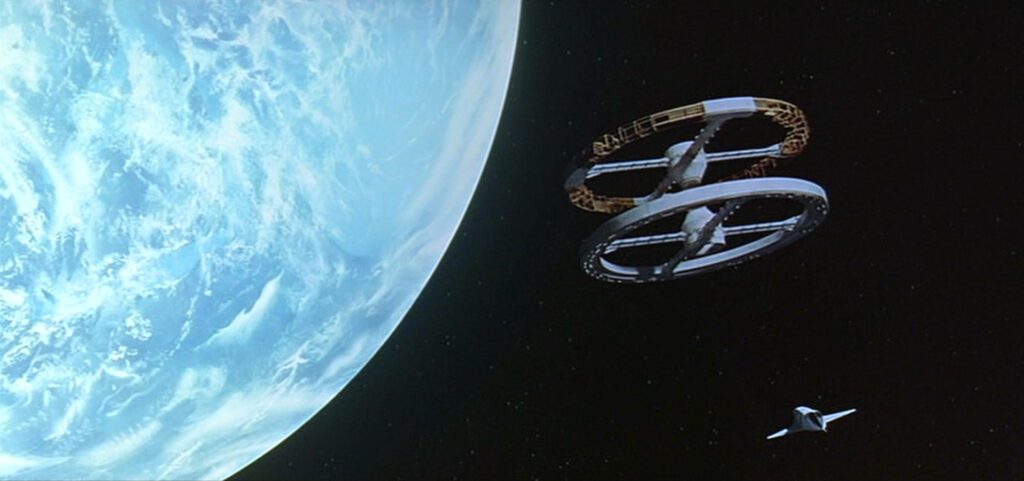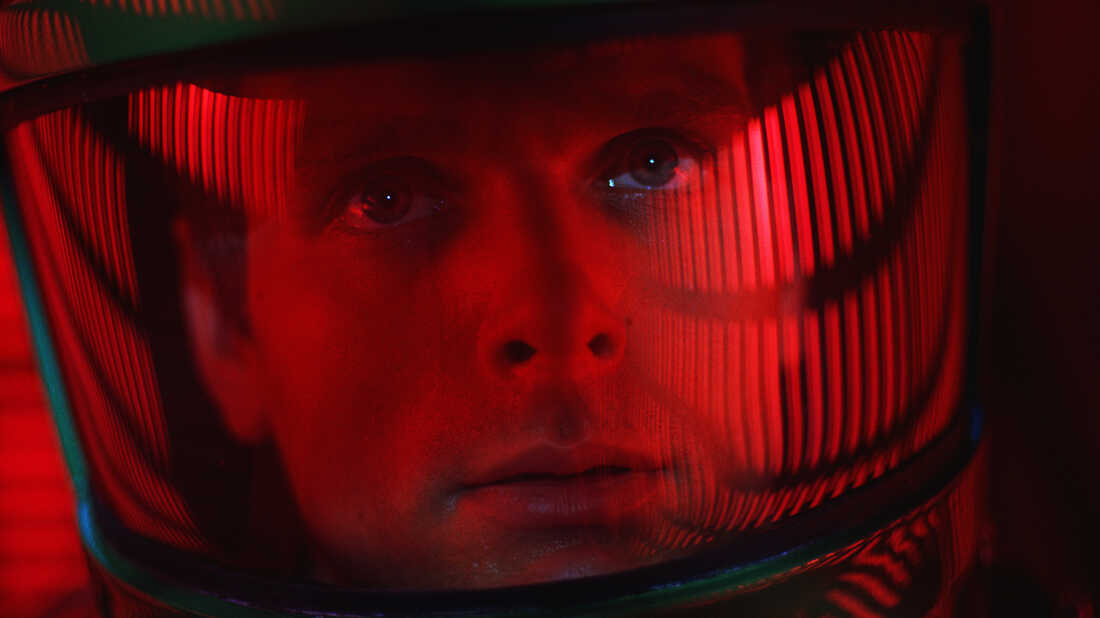2001: A Space Odyssey | Directed by Stanley Kubrick // Starring Keir Dullea, Gary Lockwood, William Sylvester, Douglas Rain (voice of HAL 9000), and Daniel Richter
Set the mood with some music!
Summary (Spoiler-free): 2001: A Space Odyssey, directed by Stanley Kubrick, is a groundbreaking science fiction epic that explores humanity’s evolution, the mysteries of the universe, and our relationship with technology. Told in four distinct parts, the film spans from our prehistoric origins to a future of deep space travel.
When I first saw 2001: A Space Odyssey, I wasn’t sure what to make of it. It’s a film that doesn’t hold your hand, doesn’t spoon-feed you meaning, and certainly doesn’t move at a modern pace. And yet, even then, I could feel that something important was happening.
Years later, in college, I took a Kubrick class, and that changed everything. Studying his body of work, analyzing frame by frame, reading about his obsessively precise creative process, it was like a switch flipped. Suddenly, I got it. I saw 2001 not just as a movie, but as a monumental achievement in film history. And now, every time I revisit it, it feels like I’m watching it for the first time again.
Let’s start with the obvious: 2001 is one of the most visually revolutionary films ever made. And that’s not hyperbole. This movie came out in 1968, before Star Wars, before digital effects, before anyone had seen a realistic spaceship on screen. And yet here it is, decades later, and it still looks stunning. The models, the sets, the lighting, the movement — it’s all done practically, and somehow it still rivals (or flat-out beats) modern CGI.
There are sequences in this movie that make your jaw drop, not because something explodes, but because the design is so perfectly imagined that you believe what you’re seeing. The elegance of the rotating spacecraft interiors, the eeriness of the monolith, and the use of silence and sound in space. It’s meticulous, surreal, and totally immersive. Kubrick didn't just imagine the future; he engineered it frame by frame.
What separates 2001 from most sci-fi films is that it’s not about plot. It’s about ideas. Evolution, technology, consciousness, time, artificial intelligence — huge concepts that Kubrick approaches with confidence and almost no exposition. You don’t get answers. You get symbols, imagery, music, and silence. And whether you leave the film feeling enlightened or completely confused, you feel something.
Kubrick trusted the audience to engage with the film on their own terms. That kind of artistic confidence is rare, and frankly, inspiring. I came to appreciate over time that this isn’t a film to understand as much as it is a film to experience. You don’t “get” 2001 on a first watch. You absorb it, wrestle with it, and let it sit in your subconscious.
HAL 9000 might be one of the most iconic villains in movie history, and yet, he’s not really a villain at all. He’s logic gone too far. His calm voice, his precise language, his terrifying restraint — it’s such a brilliant commentary on the intersection of technology and humanity. Watching HAL slowly unravel is both suspenseful and deeply unsettling, especially when the humans around him feel cold and mechanical in contrast.
That’s part of the genius of 2001: it flips expectations. The humans feel alien, and the machine feels… tragically human. Their dialogue is minimal, their body language restrained. They perform tasks, follow procedures, and rarely show any deep emotional connection, to each other or to the events around them. They feel almost robotic. It’s a bold inversion that speaks volumes without a single line of preachy dialogue.

The way Kubrick uses classical music is still unmatched. Those sweeping Strauss waltzes during space docking sequences? Pure elegance. The juxtaposition of epic score and cold, clinical imagery creates this strange, hypnotic tension that pulls you in.
And then there’s the editing — so deliberate it borders on mathematical. Long, unbroken shots. Abrupt, jarring cuts. The “match cut” from bone to satellite is STILL one of the most famous edits in cinema. Every cut in this film means something, even if it takes you a few watches to catch it.

2001: A Space Odyssey is not my favorite movie of all time, but there’s a strong argument to be made that it’s the most important one ever made. It pushed the medium forward. It redefined what sci-fi could be. It inspired generations of filmmakers, and it still feels ahead of its time over 50 years later.
What makes this film truly special to me, though, is how it grows with you. The older I get, the more I see in it. The more I feel in it. It’s abstract, yes, but also deeply emotional in a strange, existential way. It’s about our place in the universe, our relationship with technology, our search for meaning, and the silence between the stars.
Kubrick’s genius is on full display here, and my appreciation for that genius only surfaced after taking that college course. That might say something more about Kubrick than the general public. Many of his films were not loved as they were released in theaters. Only after you study them and break them down do you understand the enormity of them. Every detail, every frame, every design choice is intentional. There’s no filler. No fluff. Just precision, ambition, and vision.
2001 isn’t for everyone. It doesn’t want to be. It’s cold, cerebral, and refuses to explain itself. But for those willing to meet it where it is, it’s not just a movie—it’s a journey. A trip through time, space, evolution, and art itself.
It’s not just one of the best sci-fi films ever made. It’s one of the most important works of art we’ve ever put on screen.